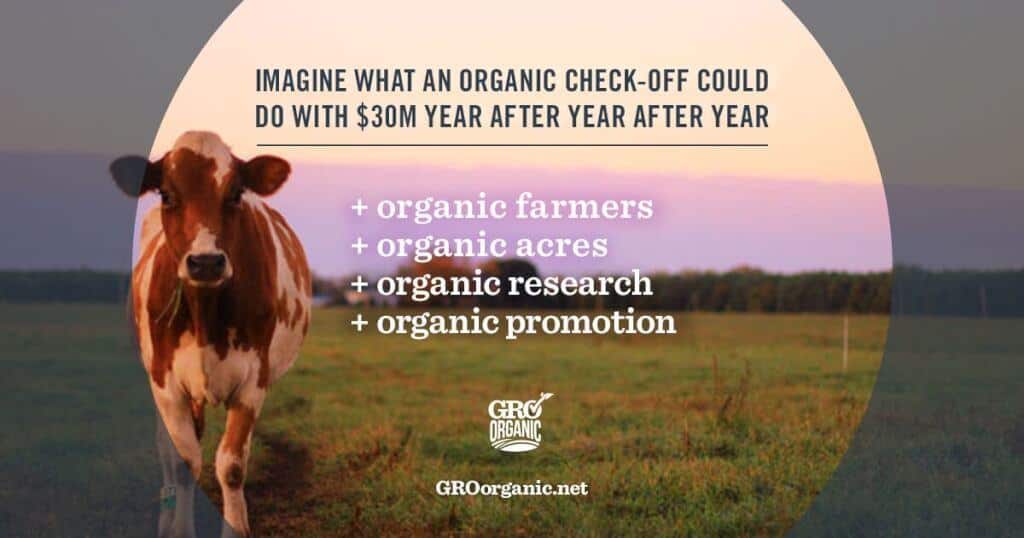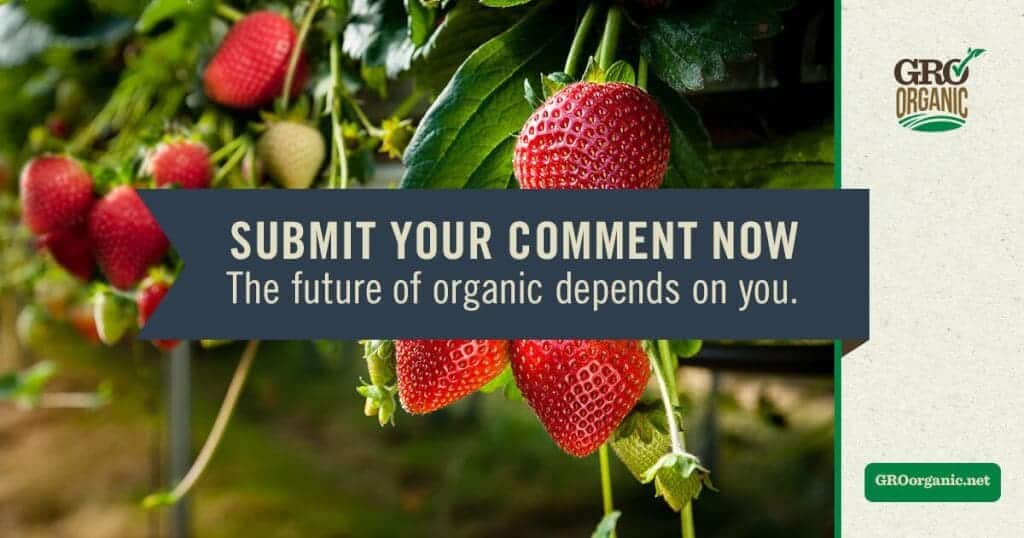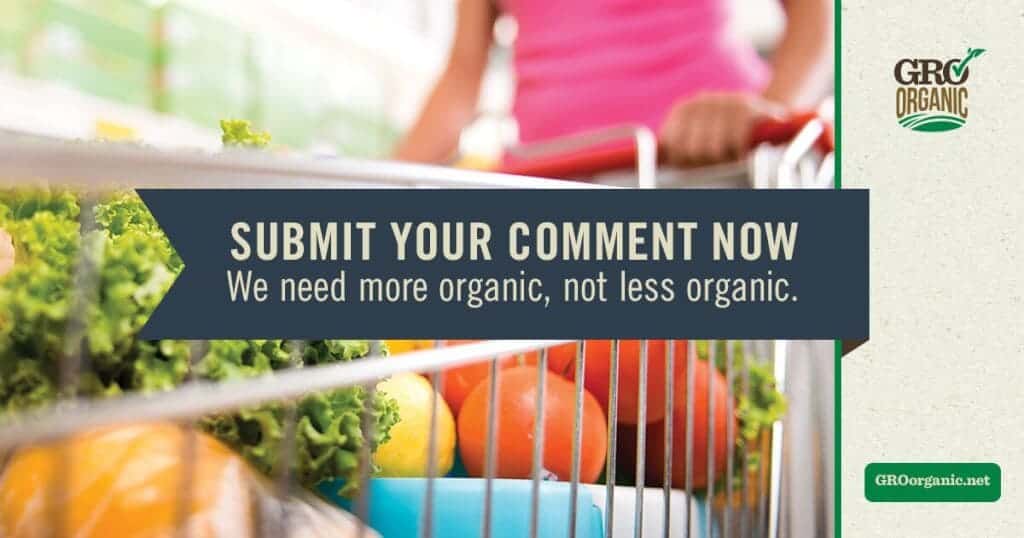Is organic food too expensive for your family? Would you like to live in a world where organic food was more affordable and you had more access to it? That future is coming soon, but in order to make it a reality, your help is needed. We’ve covered in detail why there isn’t more organic on the shelves and that answer is a bit complicated. But when it comes down to it, in order for the organic industry to grow and become accessible to everyone, some intervention is needed. Now enters the solution – the Organic Check-Off Program.
For years, organic advocates have been working for a way to strengthen the organic supply chain, promote organic practices and create outreach for consumers. And just recently, something groundbreaking has happened.
The Organic Trade Association and Gro Organic Core Committee presented an application to the USDA for an Organic Check-Off Program. This is the culmination of years of discussion with organic handlers, processors & farmers discussing in town hall meetings, over phone calls and other dialogue. The GRO Organic Core Committee is a subset of the Organic Research and Promotions Program Steering Committee, with a goal of promoting organics and providing more research support to improve organic methods in the US.
Why should you care about this? It will change EVERYTHING.
Disclaimer: This is a sponsored post with the Organic Trade Association. We at Mamavation are very excited to help them with this groundbreaking endeavor. We have received factual information from them, but our opinions on the information are ours alone. Thank you for supporting Mamavation!

Table of Contents
What Is The Organic Check-Off Program And Why Should You Care?
The Organic Check-off Program would raise over $30 million per year for promotional, educational and research activities for the organic industry. All organic certificate holders throughout the supply chain, such as producers, handlers, processors, distributors, etc., would pay a small fee to participate in the check-off program. This means that the following would be possible if approved:
- Bring new farmers into the organic industry by providing support, education and technical assistance
- Fund research that confirms the science behind why organic is more beneficial for the environment and human health
- Undertake more research that is more solution based–helping to find even better ways to control invasive pests and weed control using organic methods
- Educate consumers about what organic is and it’s benefits
- Distinguish organic from lesser claims that are unregulated seals like “natural”
- Reduce the supply crunch by transitioning more farmland to organic
And the possibilities are endless when it comes to an Organic Check-off Program. Imagine a world where there were technical specialists in farming communities helping farmers make the transition to organic. Imagine a world where young farmers were educated about the benefits of organic production with facts and science. Imagine a world where the organic industry had a marketing slogan and well-funded promotional campaign likes ones that are already out there such as “The Incredible Edible Egg”, “Pork: The Other White Meat”, “Beef. It’s What’s For Dinner” or “Got Milk?” Those are all examples of other check-off programs. The difference here is for the FIRST time, a check-off program has been proposed that is all about the processing of food instead of what the food is. And that means food that is produced and processed organically.

Who Is Involved With The Organic Check-Off Program?
Right now, there is no Organic Check-Off Program. But this can become a reality if the public joins together to support it by submitting positive comments in support of it. But who would be involved if it became a reality? The program would be headed by a 50/50 board comprised of handlers and producers, with regional representatives as well as those chosen by individuals and USDA. This organization was designed to allow the wishes of farmers to not be overshadowed by corporate interests. The Organic Trade Association has been working hard behind the scenes for years to make this a reality, but they are only the midwives, so to speak. When the Organic Check-Off Program is approved and started, they will not be in charge of it. It will take on a life of it’s own.

What Would the Organic Check-Off Program Do?
The Organic Check-Off Program would assist in growing organic farmland in the United States, providing technical assistance to farmers making the transition to organic, confirming the science behind the benefits of organic, researching solution-based techniques that can be used for better pest and weed management, and educating the public on it’s benefits. All of this has the potential to increase access to organic across the United States while making prices more affordable to all.
“The time is right for a research and promotion check-off program designed for the organic sector. It’s time for organic stakeholders to invest back in our movement — to fund research to help organic farmers, to create and initiate projects to nurture new organic farmers. An organic check-off will allow us to speak to the American consumer in a strong and unified voice” said Melissa Hughes, president of OTA’s Board of Directors and Director of Government Affairs for Organic Valley, the nation’s oldest organic dairy cooperative.”
The program also would create a strong promotion plan with ads, in-store promotions and other promotional activities to highlight and educate the consumer about organics. Education is essential to help those new to organics. As the industry is growing at the speed of light, it needs support to grow. Right now less than 1% of American farmland is organic, and yet it has the fastest growth in the food industry – sales were up 11 percent to $43.5 billion in 2015 alone. Obviously our supply is not keeping up with the demand. To fill that gap and bring the financial benefit of organic to American farmers, the Organic Check-Off Program is needed.

Where does the Organic Check-Off Program’s Money Come from?
The actual ‘check-off” assessments would require organic certificate holders that make over $250,000 to be assessed. Holders that make under that amount, can join the check-off voluntarily. The accessed would pay one tenth of one percent of net profits, so a farm that brings in $100,000 in profit per year would pay a $100 fee for the assessment. In the grand scheme of things, it’s not that much money, but added up would create an estimated $30 million for the check-off program.
Over half of the funds generated from assessments would go to research, technical and information services. Findings and research are public and will be shared with the organic community and consumers alike. No more than 15 percent of funds raised would go to administrative costs.

How Would The Organic Check-Off Program Benefit You?
We, the consumer, would benefit from an Organic Check-off Program in several ways.
AFFORDABILITY
Right now, less than 1% of farmland in the United States is certified organic. That means most of our organic food is produced outside the United States. The Organic Check-Off Program will step in here to shorten that gap between how much we demand and how much we are supplying here. With programs that provide technical assistance to farmers make the switch and education on the ground helping young farmers understand the science and benefits of organic, the industry will grow quicker. This will result in more organic food and more accessibility at home. And if you paid attention in economics class, you know that means more affordability to consumers.
SUPPLY
Currently, the organic supply chain is fractured in limited, with organic feed for livestock shipped in from overseas as well as organic produce and other items. Again, less than 1% of farmland is organic so supplying ingredients has created a squeeze. Add on expenses for that, and you have the reason why organic eggs and milk can be so expensive. Creating a strong, unbroken chain of supply in the US would provide solid feed and other resources to organic certificate holders, bringing costs down and allowing them to grow their businesses.
LABELING
When you run in wellness circles, you hear buzzwords like buy local, buy organic, avoid GMOs, etc. But what does all that really mean? Especially the word “natural”…what the heck is natural? What does the word “natural” really mean in today’s food economy? The consumer is very confused by all these buzzwords, and the Organic Check-off Program will step in to help the consumer understand all of this.
“We know first-hand how confused consumers are about organic in the broad sense. Is natural better, is GMO-free as good as organic? To have a program from a high level that educates on the benefits of organic is critical,” said Jesse Laflamme, co-owner of Pete & Gerry’s Organic Eggs based in Monroe, New Hampshire.
The overuse of health-conscious ‘buzz words’ and variety of labels in the supermarket are causing confusion. What is concerning is that the confusion on labeling is turning the term ‘organic’ into a more generic term, instead of a legal term. Consumers often confuse “organic” with “natural” and think they are the same thing. The word natural has no legal definition and can be used on just about anything. But using the organic symbol has a very special meaning and definition.
How Would The Organic Check-Off Program Benefit Those in The Organic Industry?
RESEARCH
At least 25 percent of the funds raised from the assessment process will go to research, something that is desperately needed. There is a definite need to improve and expand organic pest management research for organic production. For instance, California, which is one of the states dealing with a citrus greening disease that is lethal to citrus trees, currently has no organic solution approved for the problem. Therefore, we are losing valuable organic citrus tress to bugs. Conventional farms currently have protection to their crops. Neonicotinoids are sprayed to kill the Asian Citrus Psyllid that spread the disease (and everything else on the tree) and infected trees are removed. Neonicotinoid pesticides are prohibited for organics, so thus they need a better solution that doesn’t harm the environment, the bees, or us.
SUPPLY
Corn and soy are two of the US’s top farmed commodities, which are primarily used to feed livestock. You heard that right. The food we produce isn’t really going into our mouths. It’s going into the mouths of animals instead. But if you want organic meat, chicken & eggs, the Organic Check-Off is the solution. The Organic Check-Off Program will support and educate farmers on how they will benefit by transitioning to organic, which can help transition farmers to organic overtime quicker. The organic market has seen double digit growth for years, but organic cropland is just over 4 million of two billion acres of US cropland. Let’s fix this!
EDUCATION
The organic community has seen a need to strengthen education for farmers on the certification process, labeling, and organic techniques. Several colleges have already started organic programs, and even organic food brands are supporting educational programs to secure their supplies and help them expand. Offering access to new research, methods and information would help more farmers become educated about farming organically, including crop rotation and natural pest control.

The Organic Check-Off Program In Review…
- The Check-off Board would be made up of 50 percent producers and 50 percent handlers.
- Producers will select their regional representatives through direct balloting.
- Every single certificate holder subject to an assessment will have a direct vote – there is no bloc voting.
- Assessments would be made throughout the value chain: producers, handlers, processors, and retailers will be assessed.
- Farmers and handlers with gross organic revenue below $250,000 will choose whether or not to pay into the program.
- At least 50 to 75 percent of the funds would be earmarked specifically for research, or for activities that work hand-in-hand with research, like technical assistance and widespread dissemination of research findings.
- Twenty-five percent of the assessment from producers would be required to be used for local and regional research. A Board sub-committee of regional seat holders would recommend how those funds would be used.
- All of the research, inventions and innovations resulting from organic check-off programming would remain in the public domain.
- A referendum is required every seven years to decide whether or not to continue the program.
Sounds Great! What Can You Do To Make It Happen?
Please go here and submit your name, address and comment to the federal register. As consumers, we also have skin in the game and the USDA wants to hear from us as well. The more positive comments in the register, the more likely this will happen. Please share this post with everyone you know that is passionate about organic food. The public comment period ends on March 20, 2017.
There are literally thousands of farmers, handlers, processors that have already publicly endorsed and supported the Organic Check-Off Program (check out the full list here).
“The public comment period is an important opportunity for the organic industry to provide more feedback and to further improve the program. After USDA reviews all the comments and finalizes its proposal, then the farms, ranches and businesses that will be financially supporting this program will vote whether or not to go ahead and implement an organic check-off,” said Laura Batcha, CEO and Executive Director, Organic Trade Association. “A ‘yes’ vote starts the grand experiment for the organic sector that has been long in the making, and that could create positive and long lasting changes for all of us.”
To support the Organic Check-Off Program, visit the GROorganic.net site and add your name to the thousands of people submitting comments. The comment has already been done for you, so it’s as simple as providing your name, address and clicking a couple of times.

Thank you for supporting organics!
How do you feel about the Organic Check-Off Program? Are you planning on sharing with your friends and family? Fill us in on how you are helping the cause! And as always, XXOO.


 Why Organics Have A Shorter Shelf Life – Or A Longer One
Why Organics Have A Shorter Shelf Life – Or A Longer One
Organic food is the best
This would be great I have to drive an hour away to buy organic foods and I want to buy it in my home town but the manger of supermarket says no one buys organic and it goes bad to fast that he wont ever carry it.
What area do you live in?
That all sounds good, but I don’t see much talk about getting out there and actually promoting farming, panting crops……I read a lot about
doing “research”….the “Organic Check-off Program in Review” towards the end doesn’t say anything about acquiring land
and planting organic food. Am I missing something?
Yes, there is actually an entire part of it dedicated to farmer education and recruitment so to speak. They will be creating a staff of farm educators who will communicate the benefits both financial and environmental, etc.